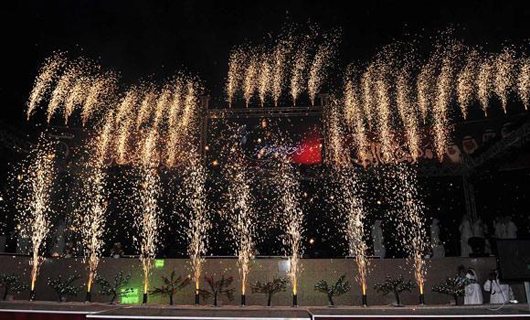
Jeddah, Jul 30: The festive fireworks that mark the beginning of Eid ended in tragedy for a Riyadh family when a 14-year-old boy died on Monday evening trying to burst a firecracker.
The latest incident comes among several other firework-related casualties during the Eid holidays.
Firecrackers are still widely available on the streets of Jeddah, Makkah, Taif, Riyadh and other cities despite strict measures to combat the phenomenon, including a financial reward of SR5,000 for anyone who reports fireworks warehouses.
Fireworks are reportedly being distributed to other parts of the Kingdom from Jeddah, believed to be the main hub.
The “Alqaat,” “Nafur,” “Thob” and “Zingabel” are popular types of firecrackers purchased by the Kingdom’s children, according to vendors approached by Arab News.
Firework packs cost SR5 last year but have since been sold at SR15.
“Parents should not allow their children to purchase fireworks, which can impair eyesight and even cause finger amputation,” said Col. Abdullah Al-Harithy, Civil Defense spokesman. “We urge parents to buy only low-density firecrackers if they must.”
Other firecrackers simply burst in the heat.
“Children used to play with amateur firecrackers in the past, but have since taken a liking to sophisticated and explosive fireworks thanks to rogue traders running loose in the market,” he said.
Dangerous fireworks manufactured in China are being smuggled into the Kingdom through the southern borders.
“We seized nearly 10,000 kg of fireworks being smuggled into the Kingdom during the first two weeks of Ramadan,” said Brig. Abdullah bin Mahfouz, Saudi Border Guards director for the Jazan region.
Ironically, fireworks are often sold by women and children during the Eid holidays, both in Jeddah and in other parts of the Kingdom.
Jeddah police have arrested several expats in the downtown area, a hub for firework sales.
Police also seized a huge quantity of fireworks and arrested vendors in Taif during Ramadan, according to Lt. Aati Al-Qurashi, Makkah regional police spokesman.
Police and municipal authorities have attempted to combat the sale of fireworks in the Hammam and Azizia areas of Riyadh, meanwhile, but these markets continue to be a major source of firework supplies sold in the capital, according to sources.





Comments
Add new comment